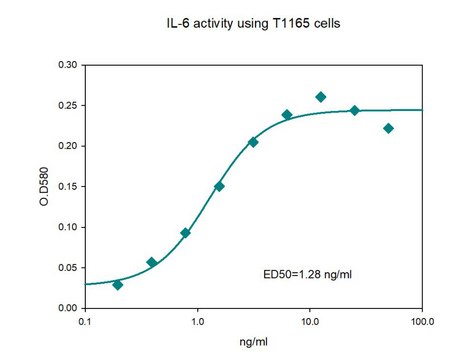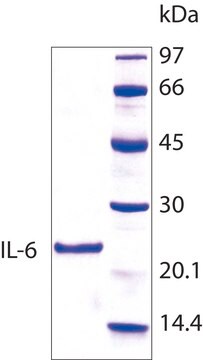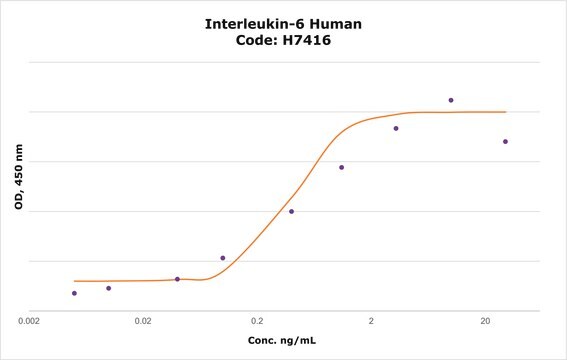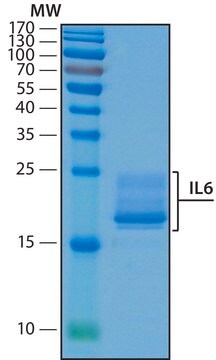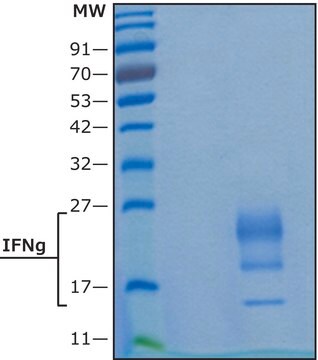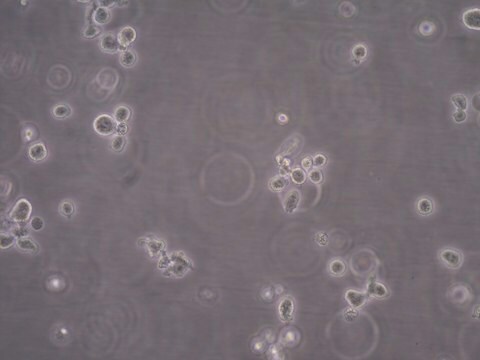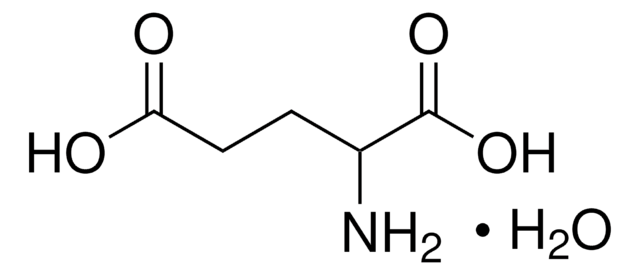GF338
IL-6,
Human Recombinant Animal Free
Synonyme(s) :
Interleukin-6, IL6
Se connecterpour consulter vos tarifs contractuels et ceux de votre entreprise/organisme
About This Item
Code UNSPSC :
12352202
eCl@ss :
32160405
Nomenclature NACRES :
NA.77
Produits recommandés
Description générale
IL-6 is a pleiotropic cytokine that plays an important role in host defense by regulating immune and inflammatory responses. Produced by T cells, monocytes, fibroblasts, endothelial cells and keratinocytes, IL-6 has diverse biological functions. It stimulates B-cell differentiation and antibody production, synergizes with IL-3 in megakaryocyte development and platelet production, induces expression of hepatic acute-phase proteins, and regulates bone metabolism. IL-6 signals through
the IL-6 receptor system that consists of two chains, IL-6R and gp130. Murine IL-6 is inactive on human cells, while both
human and murine are equally active on murine cells.
Recombinant human IL-6 is a 20.9 kDa protein containing 184 amino acid residues.
the IL-6 receptor system that consists of two chains, IL-6R and gp130. Murine IL-6 is inactive on human cells, while both
human and murine are equally active on murine cells.
Recombinant human IL-6 is a 20.9 kDa protein containing 184 amino acid residues.
Product Source: Protein is expressed in E.coli.
The protein is manufactured without the use of any animal products/reagents and is considered Animal-Free and can be used in protocols where possible transmisson of animal viruses and contamination must be avoided.
The protein is manufactured without the use of any animal products/reagents and is considered Animal-Free and can be used in protocols where possible transmisson of animal viruses and contamination must be avoided.
Application
Research Category
Stem Cell Research
Stem Cell Research
Research Sub Category
Growth Factors & Receptors
Growth Factors & Receptors
Qualité
Determined by its ability to stimulate the proliferation of mouse B9 cells.
Forme physique
Product is presented in 10mM Sodium Phosphate, pH 7.5 and is filtered through a 0.2 micron filter before lyophilization.
Stockage et stabilité
Store at -20°C for up to 4 months from date of receipt Centrifuge the vial prior to opening.
Reconstitute in water to a concentration of 0.1-0.5 mg/ml. Do not vortex. For extended storage, it is recommended to further dilute in a buffer containing a carrier protein and store in working aliquots at -20°C.
Reconstitute in water to a concentration of 0.1-0.5 mg/ml. Do not vortex. For extended storage, it is recommended to further dilute in a buffer containing a carrier protein and store in working aliquots at -20°C.
Clause de non-responsabilité
Unless otherwise stated in our catalog or other company documentation accompanying the product(s), our products are intended for research use only and are not to be used for any other purpose, which includes but is not limited to, unauthorized commercial uses, in vitro diagnostic uses, ex vivo or in vivo therapeutic uses or any type of consumption or application to humans or animals.
Code de la classe de stockage
11 - Combustible Solids
Classe de danger pour l'eau (WGK)
WGK 1
Certificats d'analyse (COA)
Recherchez un Certificats d'analyse (COA) en saisissant le numéro de lot du produit. Les numéros de lot figurent sur l'étiquette du produit après les mots "Lot" ou "Batch".
Déjà en possession de ce produit ?
Retrouvez la documentation relative aux produits que vous avez récemment achetés dans la Bibliothèque de documents.
Zhi Chen et al.
Journal of cellular physiology, 234(11), 19977-19989 (2019-04-05)
Inflammation is one of the major causes of intervertebral disc degeneration (IDD). Emerging evidence has revealed that increase in the levels of pro-inflammatory cytokines, such as interleukin 6 (IL-6) and tumor necrosis factor alpha (TNF-α), can activate a variety of
Ruo-Yu Chen et al.
Cell death & disease, 12(11), 983-983 (2021-10-24)
Chronic and persistent inflammation is a well-known carcinogenesis promoter. Hepatocellular carcinoma (HCC) is one of the most common inflammation-associated cancers; most HCCs arise in the setting of chronic inflammation and hepatic injury. Both NF-κB and STAT3 are important regulators of
Notre équipe de scientifiques dispose d'une expérience dans tous les secteurs de la recherche, notamment en sciences de la vie, science des matériaux, synthèse chimique, chromatographie, analyse et dans de nombreux autres domaines..
Contacter notre Service technique